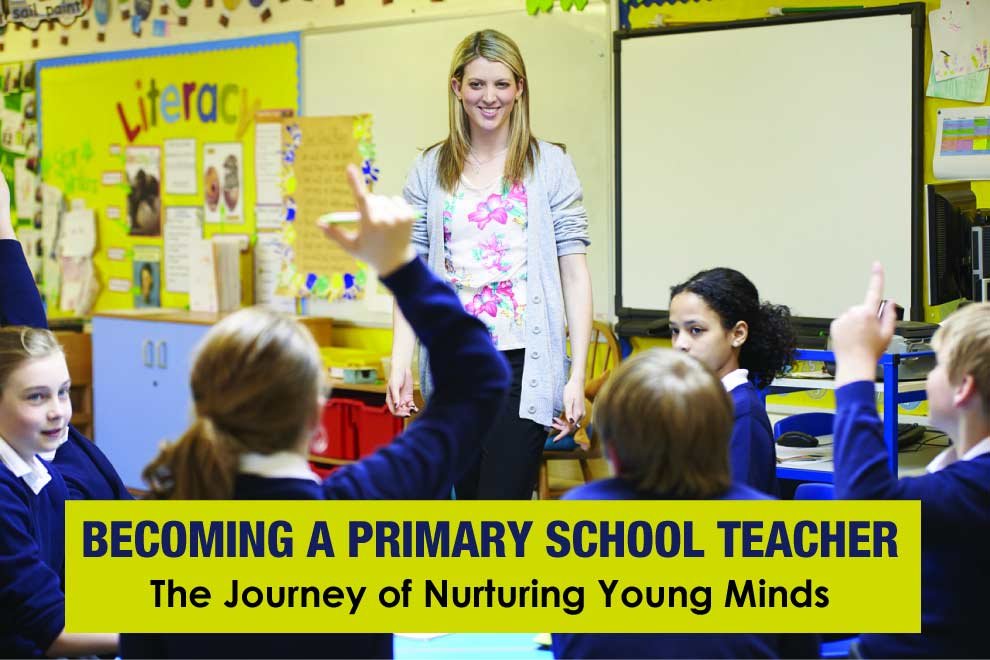To become a primary school teacher, you need to have a strong desire to help shape the future and a willingness to put in a lot of effort and hard work. It’s a profession that requires a lot of dedication and passion, but it can be very rewarding. While it can be demanding to keep up with primary teaching resources, the job’s biggest reward is the ability to positively influence young learners. This article will discuss the education, skills, daily experiences, and qualities required to be a successful primary school teacher.
The Educational Requirements
Bachelor’s degree in education: To become a primary school teacher, you need to obtain a four-year bachelor’s degree. This degree program will teach you various theories and methods of teaching, and you can choose to focus on early childhood or elementary education.
Teacher certification: Following the completion of a bachelor’s degree, prospective teachers must obtain teacher certification, a prerequisite for teaching in most countries. Certification requirements can vary but generally involve passing standardized tests, fulfilling student teaching internships, and adhering to specific state or national criteria.
Continuing education: Beginning your career as a certified primary school teacher is just the start. If you want to do well in your work or career, it’s important to keep learning and improving your skills. One good way to do this is by going to workshops, classes, and other educational events. There are plenty of options out there to help you keep up with new developments in your field.
Essential Skills and Qualities
To become a primary school teacher, you need a variety of skills and personal qualities. Accomplished teachers possess the following critical attributes:
Patience: Patience is essential when working with young children. Teachers need to explain concepts repeatedly and provide consistent support as students learn.
Effective communication: Teaching requires clear communication and adapting to diverse learners.
Adaptability: Primary school teachers must be adaptable and ready to adjust their teaching methods to accommodate different learning styles and abilities within their classrooms.
Organizational skills: Managing a classroom, planning lessons, grading assignments, and tracking student progress all require strong organizational skills.
Empathy: Teachers who show empathy can develop stronger emotional bonds with their students. This is crucial for creating a classroom atmosphere that’s welcoming and encouraging.
Creativity: Effective teachers use different methods like interactive activities, educational games, and storytelling to get students interested and excited about learning. They try to be creative and make learning fun.
Time management: Efficiently managing teaching responsibilities, from delivering lessons to attending meetings, necessitates excellent time management skills.
A Day in the Life of a Primary School Teacher
Let’s examine a primary school teacher’s daily routine.
Lesson planning: Teachers start each day by thoughtfully planning lessons that align with curriculum standards, cater to students’ unique needs, and include defining learning objectives, selecting teaching materials, and creating assessments.
Classroom management: It’s really important for teachers to create a positive and well-organized learning environment for their students. They make rules for how everyone should behave, take care of the everyday things that happen in class, and deal with any problems that come up.
Assessment and grading: Teachers keep track of how well their students are doing in school by giving them different types of assignments, like quizzes, tests, projects, and homework. They grade these assignments to give students feedback and determine where they need extra help. By doing this, the teachers can adjust their teaching methods and ensure that every student gets what they need to succeed.
Parent communication: To help children do well in school, it’s important for teachers and parents to talk regularly. They can talk about how the child is doing, any worries, and ways to improve things. This way, everyone can work together to ensure the child is doing their best.
Administrative work: Teachers handle administrative tasks, like recording attendance, submitting grades, and participating in faculty meetings. Teachers are responsible for many things in the classroom. They create plans for what students will learn and give them assignments to complete outside of class. Teachers also talk to students’ parents when there are discipline issues. They help students figure out what they want to do after they finish high school.
Extracurricular activities: Teachers often engage in extracurricular activities like coaching sports, advising clubs, and organizing field trips to enhance students’ experiences beyond the classroom.
Challenges Faced By Primary School Teachers
While primary school teachers are incredibly rewarding, they present challenges:
Diverse classrooms: Classrooms today have students from different cultural, linguistic, and socioeconomic backgrounds. Teachers must tailor their teaching strategies to accommodate all students, especially those with special needs or learning disabilities.
Large class sizes: Some teachers contend with teaching large classes with limited resources. Managing a classroom with numerous students can be daunting, and providing individualized attention can be challenging.
Standardized testing pressure: In many educational systems, standardized testing takes center stage. Teachers may feel compelled to “teach to the test,” which can restrict creativity and flexibility in the classroom.
Parental expectations: Balancing parents’ expectations, each with their unique perspective on education, can be intricate. Effective communication with parents while maintaining professional judgment is crucial.
Work-life balance: Teaching can be demanding, and many teachers strive to maintain a healthy work-life balance, especially during peak periods such as report card season or parent-teacher conferences.
Rewards of Being a Primary School Teacher
Despite the challenges, primary school teachers offer profound rewards:
Making a difference: Exceptional educators can influence the future by instilling wisdom and principles in the upcoming generation. Their influence can potentially leave an indelible mark on their students for life. Teachers can mold their students’ futures by demonstrating integrity, respect, and perseverance. They can also aid in developing critical thinking skills, enhance self-esteem, and refine problem-solving abilities. Finally, educators have the ability to inspire their students to follow their aspirations and achieve their maximum potential.
Building relationships: Primary school teachers form strong bonds with their students, enjoying witnessing their growth and success.
Creativity and innovation: In the classroom, teachers face the challenge of engaging students while making learning enjoyable. However, this also provides fulfillment for them.
Job security: Teaching offers relative job security, with a consistent demand for qualified educators, ensuring career stability.
You will need a solid education, various skills, and a real passion for nurturing children’s growth and learning to have a fulfilling career as a teacher. It can be a powerful and fulfilling profession that positively impacts the world.
ALSO READ: How to start online teaching Career: Calculative and Constructive Guide










